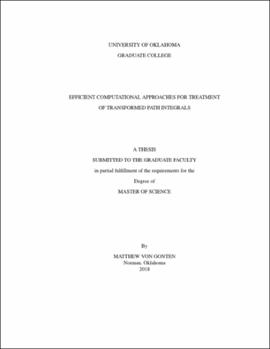| dc.description.abstract | In this thesis, efficient computational approaches for treatment of transformed path integrals (TPIs) are proposed. The TPI-based method allows us to calculate the time evolution probability density functions (PDFs) using a short time propagator matrix that accounts for the transition probability in a transformed domain. A grid-based implementation of the TPI, in contrast to the conventional fixed-grid implementation of a path integral (PI), allows the propagation of the PDF to be performed on a dynamically adaptive grid parametrized by the mean and covariance of the PDF. TPI-based methods generate PDFs from all possible paths within the transformed space, and while these methods are found to be highly effective at capturing tail information in systems with large drifts, diffusions, and concentrations, they can become somewhat computationally expensive when applied to systems that must be represented by large numbers of data points. The purpose of this thesis is to develop computationally efficient TPI-based methods that largely preserve the accuracy and other desirable features of the original TPI method.
The first proposed method, referred to as the bandlimited TPI (BL-TPI) method, takes advantage of the fact that the transition probability is often concentrated around a set of peaks, with one natural peak occurring for each source state. This allows us to consider sparse matrix representations of the transition probability matrix operator and consider a region of importance about the peak transition probability curve for consideration in PDF propagation while neglecting all values outside of this region. With the use of sparse matrix tools, the BL-TPI enables us to perform PDF propagation using far fewer operations than the standard implementation. In the second proposed method, a TPI implementation based on the Symmetric Fast Gauss Transform (SFGT) is proposed. This method utilizes a Taylor series expansion of the Gaussian kernel in the propagator matrix to reduce the convolution operation for the PDF to an infinite sum of moments. This allows us to perform calculations involving source and target terms separately, eliminating their convolution and in the process potentially reducing the associated computational complexity.
In order to demonstrate the effectiveness of the proposed approaches, comparisons with the standard TPI implementation are performed for canonical problems in onedimensional and multi-dimensional state spaces. The results from the BL-TPI method
appear promising and indicate that the method is applicable to a wide range of cases. In contrast, the effectiveness of the SFGT approach is found to be inherently conditional, and the computational cost of this method can exceed that of the standard TPI method in many cases. | en_US |
